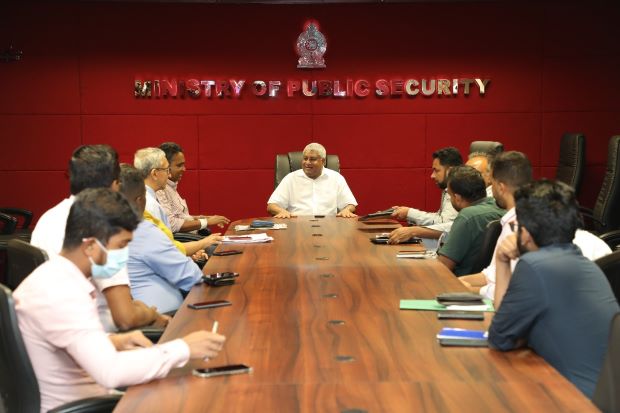After protests, Alles agrees to broader consultation on Online Safety Bill
COLOMBO – Sri Lanka’s Public Security Minister Tiran Alles, who earlier this week tabled a controversial Online Safety Bill (OSB) in Parliament, on Friday (6) agreed to have broader consultation with key stakeholders before voting in the legislature.
Opposition parties, media organizations, and social media activists have raised concerns over the government move to introduce the bill.
Though the government initially said the expected legislation was to protect children and women from negative impacts of the internet like pornography and harassment, the proposed law has alarmed many due to its many grey areas and lack of proper definition.
Alles, at a meeting with media and civil society organizations on Friday said he was asked by President Ranil Wickremesinghe’s cabinet to table the bill in Parliament.
“As a result of this discussion, while considering the suggestions and proposals put forward by the (stakeholder) group, Public Security Minister Tiran Alles said he expects to discuss the bill with the Asian Internet Coalition, Sri Lanka Bar Association, diplomatic office, as well as civil and media organizations,” the Public Security Ministry said in a statement.
The key objectives of the bill includes protecting persons against damage caused by misinformation and introducing measures to detect, prevent, and safeguard against misuse of online accounts and bots to commit offences.
However, a president-appointed commission determining what should be prohibited online, non-specific offences that could manipulate the interpretation of the bill, and the commission having quasi-judicial powers have raised concerns that the bill, if it passed as it is, could threaten media freedom as well as freedom of expression.
Opposition and civil society groups have filed cases against the bill citing that most clauses are infringing their fundamental human rights and is against the country’s constitution.
Some legal experts have opined that the bill, as in the current format, may need a two-third Parliament majority and referendum to make it a law.
The stakeholders at the meeting told the minister that a social agitation has been created due to lack of broader discussion about the bill before it was presented to Parliament.
They also said the bill could deprive the freedom of expression with a politically motivated non-independent commission overseeing online content.
The minister however said the bill has been in the draft format since 2016 under two justice ministers and he just tabled it.
-economynext.com



Comments are closed, but trackbacks and pingbacks are open.